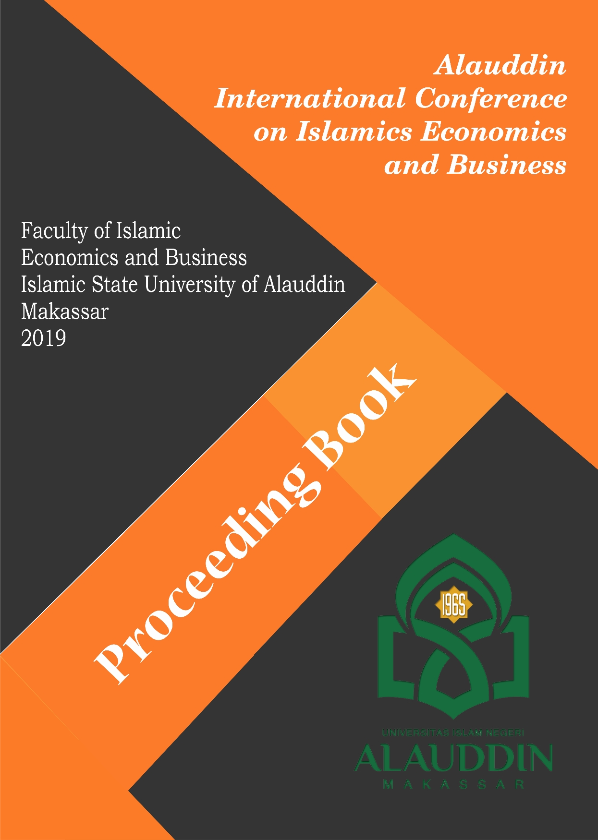THE ROLE OF SHARIA FINANCIAL INSTITUTION TO EMPOWERING SMEs
Abstract
This study aims to determine the efforts of Islamic Financial Institutions in empowering SMEs, strategies and important roles carried out by LKS in order to empower SMEs through the provision of capital to be managed in business. The method used in this research is descriptive analysis method, a method that only describes various forms of paradigms about empowerment strategies for SMEs, the most important data sources in this study are related to the search for library data, relevant books, and scientific papers. others relevant to the object of study. The results of this study indicate that there has been much power and effort carried out by the Islamic Finance Agency in order to empower SMEs, this can be proven by the existence of several programs, products, and financing aimed directly at SMEs. The strategy used is; provide complete information as well as promotion to SMEs, provide financing for their business development, provide financing in accordance with the type of business that SMEs are involved in with the concept of sharia principles. The implication of this research is to continue to provide services professionally and provide the best so that they are truly able to provide community welfare, more selective in providing financing so as to minimize the losses that will occur, increase technological resources so that SMEs can easily access information.
Downloads
References
Al-Qur'an and its Translation
Ardic, O.P., N. Mylenko, V. Saltane, Small and Medium Enterprises: A Cross-Country Analysis with A New Data Set. World Bank Policy Research Working Paper 5538 (2013).
Arni, E.S. “Small Business Development Strategy Through Increasing Accessibility of Banking Credit”. Journal of Infocop (2006), h. 29.
Amen Azis. The Printis' tenacity. Jakarta: MAA Institute, 2007.
Al-ldrus Salim. "Empowering Indonesian Small and Medium Enterprises (SMEs) in the Reformation", El-Harakah Journal, Vol. 7 no. 1 (2005): h. 86.
Beck, T., A. Demirguc-Kunt, V. Maksimovic. “SMEs, Growth, and Poverty: Cross-Country Evidence”. Journal of Economic Growth, Vol.1, No.2 (2010), h. 10.
Gunawan, Diah Setyorini. "The Strategy Development of SME's Metal The Strategy Development of SME's". Journal of Economics and Policy, Vol.10, No. 1 (2017): h. 121-137.
Hamidah Siti. "Analysis of the Linkage Policy of the Sharia Financial Institution Program in the Framework of Empowerment of SMEs in Indonesia, Legal Arena" 8, No. 2, (2015): h. 147-399.
Hasan Ridwan. Management of Baitul Mal wa Tamwil. Bandung: Faithful Library, 2013.
Huda Nurul & M. Heykal. Islamic Financial Institutions: Theoretical and Practical Reviews. Jakarta: Kencana Pranada Media Group, 2010.
Jenita. "The Role of Islamic Microfinance Institutions in Economic Empowerment of Small and Medium Communities" Al-Masraf: Journal of Financial Institutions and Banking, Vol.2. No. 2 (2017).
Ministry of Cooperatives and Small and Medium Enterprises. UMKM Absorbs 97 Percent of Workers in Indonesia. Available at: (2013) http://www.depkop.go.id/index.php?option=com_content&view=article&id=1281:umkm-serap-97-persen-tenaga-kerja-di-indonesia&catid=50:bind- news & Itemid = 97 accessed on 1st of November 2015.
Kristiyanti M. “The Strategic Role of Small and Medium Enterprises (SMEs) in National Development”. Magazine of Scientific Informatics, (2012).
Muheramtohadi Singgih. "The Role of Islamic Financial Institutions in Empowering MSMEs in Indonesia". Muqtasid Journal, Vol.8, No. 1 (2017): h. 65-77.
Maesaroh Siti. “Effectiveness of Linkage of Bank Syariah Mandiri Program in Strengthening Financing of Microfinance Institutions”, Thesis, Faculty of Sharia and Law, Hidayatullah State Islamic University. Jakarta, 2011.
Machmud Amir. The Strategy for Empowering Micro, Small and Medium Enterprises through the Role of Islamic Financial Institutions in Efforts to Eradicate Poverty in Indonesia, 2013.
Nuryadin Hadin. BMT and Islamic Banks: Instruments of the Syari'ah Financial Institution. Bandung: Bani Reader Quraish, 2004.
Sukidjo. "Small and Medium Business Empowerment Strategy". Journal of Economics & Education, Vol.2. No. 1 (2004).
Soemitra Andri. Islamic Banks and Financial Institutions. Cet. 4: Jakarta: kencana, 2014.
Sholihin, Ahmad Ifham. General Guidelines for Islamic Financial Institutions. Jakarta: Alfabeta, 2009.
Suhendi Hendi. Muamalah Fiqh. Jakarta: Rajawali Press, 2010.
Yoshino, N. and F. Taghizadeh-Hesary. “Major Challenges Facing Small and Medium-sized Enterprises in Asia and Solutions for Mitigating Them”. Asian Development Bank Institute Working Paper 564 (2016).

